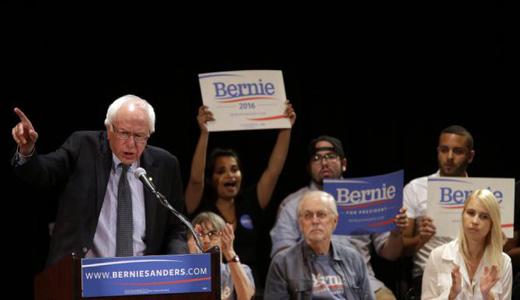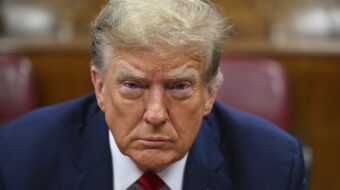
NEW YORK – Campaigning to be the Democratic candidate for president, Sen. Bernie Sanders, I.-Vt, last week repeated a pledge he has made in speeches across the country: If elected, he said, he will break up the big banks.
The difference between this speech and others is that Sanders delivered it in a packed theater near Times Square, just a few subway stops from Wall Street. None of the corporate-owned media networks paid much, if any, attention to the speech.
“If a bank is too big to fail, it is too big to exist,” Sanders said. “When it comes to Wall Street reform, that must be our bottom line.” He was referring to the fact that tottering banks were given public bailout funds after the 2008 economic crash because it was widely believed that if they failed they would bring down the entire economy.
Sanders said that “a handful of huge financial institutions simply have too much economic and political power over this country. … Too few banks control too much of our money. … It gives them [too much] influence in Congress.”
He said, “In 2008, the greed, recklessness and illegal behavior on Wall Street nearly destroyed the U.S. and global economy.” He promised to file criminal charges against the bankers responsible for the financial crisis.
Both Sanders and Hillary Clinton have called for “reining in Wall Street.”
Clinton maintains that regulating hedge funds should be the top priority. She says that unregulated “shadow banks” like AIG and Lehman Brothers, not big commercial banks, were the real culprits in the 2008 recession.
Sanders responded to this view in his Times Square speech. He said, “Shadow banks did gamble recklessly, but where did that money come from? It came from the federally insured bank deposits of big commercial banks.”
He called for the passage of a modernized Glass-Steagall Act, a depression-era law that prohibited commercial banks from engaging in investment banking activities.
The main provisions of Glass-Steagall were repealed in 1999 during the presidency Bill Clinton.
Neither Sanders nor Clinton have called for a basic re-structuring of the U.S. economy that would prevent the cycle of boom and bust. Neither has endorsed the growing grassroots movement for publicly owned banks.
However, in his Times Square speech Sanders proposed “a banking system that is part of the productive economy, making loans at affordable rates to small- and medium-sized businesses so that we create decent-paying jobs.”
He said, “One important way to provide decent banking opportunities for low income communities is to allow the U.S. postal Service to engage in basic banking services.”
Furthermore, he called for new laws to prevent usury. “Today,” Sanders said. “If you live in a low-income community and you need to cash a check or get a loan to pay for a car repair or a medical emergency, where do you go? You go to a payday lender who could charge an interest rate of over 300 percent and trap you into a vicious cycle of debt. That is unacceptable. We need to stop payday lenders from ripping off millions of Americans.”
Also, Sanders proposed a financial transactions tax on Wall Street trading. He said it would discourage risky gambling on the market and encourage investments in the job-creating economy. As president, he said, he would use this tax to help pay for tuition-free public colleges and universities.
What’s more, Sanders proposed that the Federal Reserve be restructured. He said that decisions should be made more democratically and that big banks should be blocked from having a say in the agency that’s supposed to be regulating them.
Sanders said he’s sure that “the American people would be shocked to learn that JP Morgan Chase CEO Jamie Dimon served on the board of the New York Fed at the same time that his bank received a $391 billion bailout from the Federal Reserve. That is a clear conflict of interest that I would ban as president.”
Sanders pointed out that since 2008 a shrinking number of banks have gained control over larger segments of the U.S. economy.
“Incredibly, the six largest banks in this country issue more than two-thirds of all credit cards and over 35 percent of all mortgages,” Sanders said. “They control more than 95 percent of all financial derivatives and hold more than 40 percent of all bank deposits.”
The four largest banks have spent at least $21 million lobbying the federal government.
Sanders concluded by saying “Yes [the banks] have an endless supply of money. But we have something they don’t have. And that is that when millions of working families stand together, demanding fundamental changes in our financial system, we have the power to bring about those changes.
Photo: Democratic presidential candidate Sen. Bernie Sanders, I-Vt., speaks during a campaign event, Tuesday, Jan. 5, 2016, in New York. | Mary Altaffer/AP












Comments